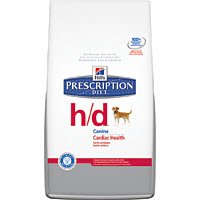Contents
Our Pick For Top 4 Best Low Sodium Dog Foods
- Hill’s Science Diet Adult Sensitive Stomach & Skin Dry Dog Food
- ROYAL CANIN Canine Early Cardiac Dry
- Hill’s Prescription Diet h/d Cardiac Health Dry Dog Food
- Iams Weight Loss/Mobility Plus canine
Low sodium dog food is the most critical dietary consideration for dogs experiencing heart conditions such as congestive heart failure. High sodium intake may cause your dog to have an increased thirst accompanied with higher intake of water. A veterinarian may restrict you from feeding your dog with high sodium content diet when your dog suffers from kidney disease, liver disease or a heart failure.
A dog, which is suffering from congestive heart failure, normally retain excessive amounts of sodium ions in the body. Administration of sodium through sodium containing foods leads to the worsening of the condition due to the build-up of fluids in the dog’s body causing the dogs heart to strain in its normal functioning. Feeding your dog with a low sodium dog foods coupled with an early treatment helps in keeping your dog healthy.
Best Low Sodium Dog Food Comparison
Last update on 2018-08-24 / Affiliate links / Images from Amazon Product Advertising API
Canine sodium nutritional needs
The sodium in the diet is important for the biological processes in your dog’s body such as the normal growth and development. Healthy dogs do not have a restriction on the amount of sodium they consume unlike the ones having a heart condition where you are required to take precautions. The healthy dog can consume a diet rich in sodium levels than that contained in commercial dog foods without experiencing high blood pressure and water retention in their bodies.
The owners of dogs having a heart disease must consult a veterinarian before feeding their dogs. A dog with a heart condition is not able to effectively excrete sodium ions from their bodies. The following is a guide to the required sodium content for your dog:
Allowable sodium content as percent dry matter (%).
- Mild sodium restriction 0.3-0.4
- Moderate sodium restriction 0.2-0.3
- Marked sodium restriction 0.15-0.2
- Extreme sodium restriction 0.075-0.15
Mild sodium restriction is recommended for the middle-aged and older dogs. Moderate sodium restriction is recommended for dogs with a moderate heart disease while those having congestive heart failure should be given a marked sodium restriction. Extreme sodium restrictions are recommended for dogs having a refractory congestive heart failure.
How to choose a proper food
As the dog owner, you are left with the sole responsibility of deciding the type of food to feed your dog. The commercial dog foods sold in the market consist of various ingredients that should be taken into consideration. The food contains varying amounts of macronutrients, vitamins, and minerals that should be analyzed before settling for the type of food to feed your dog. Below are some of the guidelines to use when choosing the right type of food for your dog.
1. Assess your dog’s health properly
Note down all the health concerns your dog might be having such as a bad breath, goopy eyes, recurrent diarrhea, constipation and many others. Then note down differently the health assets that your dog has that may include fresh breath, clean teeth, clean ears, glossy coat, normal appetite among others. Then look at the number of health concerns your dog might be having, compare them to the number of health assets it has.
If the dog has more assets than problems, this will assist you to select easily the food that works best for your dog. A dog having more health concerns than the assets may require you to change its diet and also approaching a veterinarian for health advice.
2. Nutritional management of disease conditions
Nutritional therapy could help in the prophylaxis or treatment of your dog’s disease. A veterinarian advice should be sought for by dog owners before choosing the diet for their dogs. With the introduction of low sodium dog food brands in the market, you should be careful when purchasing them as some of them may have a lower-quality ingredients.
You also need to conduct your research to try to find out the dietary changes that may be of great benefit to your dog. Consider going through Donald R. Strombeck’s Home-Prepared Dog Diets, Dr. Strombeck illustrates the strategies to use when changing your dog’s diet to help prevent/treat certain conditions such as hepatic disease, heart disease gastrointestinal disorders among others.
Various conditions can be improved through dietary management. These condition include:
• Allergic reactions; consumption of some foods could result in your dog experiencing allergic reactions. It is a mandatory for you to keep records of the type of food and their content to avoid allergic reactions occurring to them.
• Inherited metabolism disorders; dogs could also be predisposed to metabolic disorders resulting from certain diets. An example is copper accumulation in the liver tissue may require administration of diets with a very low copper content.
• Cancer; If your dog suffers from cancer, it is advisable for you to provide it with food consisting of high fat and low carbohydrate content.
3. Caloric considerations
The caloric content of your dog’s food is another critical consideration. You may need to choose diets with higher or lower calorie content based on the following attributes:
• Activity level; If your dog is involved in more hectic physical activities, you may need to choose diets with higher caloric content.
• Growth; growing dogs require a high energy supply compared to adult dogs. Ideally, these dogs should be fed with diets having a higher protein content together with a moderate caloric content.
• Age; ageing dogs require low caloric contents in their foods to help them maintain their body weight and health condition.
• Environmental conditions; dogs staying in environments having extremely low temperatures may need foods containing high levels of calories.
• Other attributes dictating the caloric content for you dog food include sickness, reproduction where a lot of energy is required for the reproduction process and lactation by the female dog.
4. Human factors
These include the cost of the commercial food together with their availability. The reliability and responsiveness of the food manufacturers should also be taken into consideration in the process of choosing food for your dog.
Best Low Sodium Dog Foods
Hill’s Science Diet Adult Sensitive Stomach & Skin Dry Dog Food
- Hill'S Science Diet Adult Sensitive Stomach & Skin Natural Dog Food Is Formulated For Adult Dogs With Food Or Skin Sensitivities
- Complete, Nutritionally Balanced Dry Dog Food Is Made With High-Quality Ingredients That Are Easy To Digest
Last update on 2019-01-04 / Affiliate links / Images from Amazon Product Advertising API
This diet provides a high quality and properly balanced ingredients that are efficiently absorbed through the stomach membrane without much difficulties. The diet is made up of antioxidants that help boost the body immune system together with fine fiber to provide the healthy bowel movements.
The diet also features low calories level to maintain the optimum weight of your dog. It also has L-carnitine to provide a lean muscle and ideal weight. The high fiber content in these foods helps control the dogs hunger between meals. It is also made of vitamin E and C that help boost the immune function of the body.
ROYAL CANIN Canine Early Cardiac Dry
- Omega-3 fatty acids to help prevent tissue inflammation in your pet.
- Moderated sodium content to reduce blood pressure and heart workload in dogs.
Last update on 2019-01-04 / Affiliate links / Images from Amazon Product Advertising API
It is the best diet to start on your dog to ensure good health of their cardiac system. The diet is made up of nutrients that help build up the cardiac tissue together with the omega-3 fatty acids that help prevent inflammation in the dog tissues. The diet is also well suited for dogs with a heart condition that require foods with low salt content. The diet consists of moderated sodium levels that help reduce high blood pressure and the workload of the heart.
Hill’s Prescription Diet h/d Cardiac Health Dry Dog Food
- Low level of sodium to help maintain normal blood pressure
- High level of taurine to help support cardiac muscle metabolism
Last update on 2019-01-04 / Affiliate links / Images from Amazon Product Advertising API
This is a dog food containing low levels of the sodium ion. Low salt dog foods help maintain the blood pressure in ageing dogs at normal levels. The diet is also made of high levels of taurine that help maintain the structure of the cardiac tissue. Other contents in the food include L-carnitine, high vitamin B contents and magnesium ions that help restore lost nutrients from the body. The prescription diet is veterinary approved to be used in dogs having heart conditions.
Iams Weight Loss/Mobility Plus canine
Last update on 2018-08-24 / Affiliate links / Images from Amazon Product Advertising API
The diet is well prepared to help your dog attain and maintain their optimal weight. The diet also is good at promoting the entire body health of your dog together with replenishing energy that is lost through activities. The diet features a mix of carbohydrates from sorghum and barley that help maintain a steady blood sugar and resistance to increase in body weight.
Beneficial supplements for a dog with heart disease
The supplements that are recommended for dogs suffering from a heart disease include:
• Taurine; it is an amino acid recommended for your dog when it develops a heart disease. Small dogs can be given 250 mg of taurine; medium sized dogs are given 500 mg while large dogs are given 750 mg of taurine. Vitamin B is also essential for the conversion of taurine in the body thus you may give B complex vitamin supplement together with taurine.
• Carnitine; it is also an amino acid necessary for giving the heart the energy it require to work. Small dogs are given 500 mg; medium sized are given 1,000 mg while large sized are given 2,000 mg twice a day.
• Arginine; dogs having a congestive heart failure may be supplemented with arginine amino acid. The beneficial effects of this supplement include improved endothelial function and cardiac output together with an improved exercise tolerance.
• Fish oil; this provides the dog with omega-3 fatty acids. The amount given is 1,000 mg fish oil containing 300 mg of DHA and EPA per 10 pounds of body weight daily.
• Coenzyme Q10 is an antioxidant beneficial to dogs having a heart disease.

I have lived in big cities my entire life. Having grown up on the Upper East Side in Manhattan, my early life was an exciting one, filled to the brim with interesting encounters and opportunities popping up at every street corner. Like many city people, my passion for dogs first started when my parents decided to bring a puppy into the household. For them, it was a way of getting me to spend less time at his computer or wandering aimlessly around the city with my friends. Little did they know that bringing a Labrador Retriever into their apartment would determine not only the course of their son’s professional career but also my love life.
Having obtained a Computer Science Bachelor’s degree from Fordham University, I went on to pursue an IT career in the Big Apple. After a few years of doing basic cybersecurity and tech support work in various offices around Manhattan, I decided to leave New York and look for my calling in Boston, Massachusetts. There, I got a Master’s degree in Computer Science with a specialization in Web Development. As a means of supporting myself through college, he found a salesman job at a local paper company, where he met Mary, the love of my life and the person I’d end up creating My Sweet Puppy with.






![The Best 4 Low Sodium Dog Foods [2021 Buyer’s Guide]](https://mysweetpuppy.net/wp-content/uploads/2015/12/low-sodium-dog-food1.jpg)
